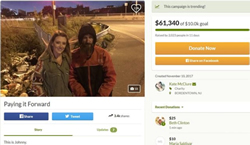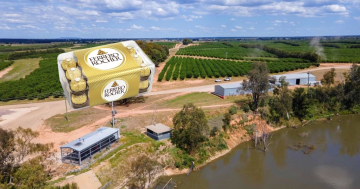Alicia Adamczyk* says crowdfunding campaigns are an effective way for people to help others in need, but a recent case of fraud demonstrates the need for caution.
 Crowdfunding campaigns are effective ways for people to help others in need.
Crowdfunding campaigns are effective ways for people to help others in need.
But news that a US couple conspired with a homeless man to create a heartwarming Good Samaritan story to scam people out of money highlights the importance of vetting viral feel-good stories before donating.
Mark D’Amico, Kate McClure and Johnny Bobbitt, jr, are being charged with second-degree theft by deception and second-degree conspiracy after reportedly creating a fake story about a good deed and raising over US$400,000 ($552,000) on the crowdfunding platform GoFundMe (pictured).
McClure and D’Amico claimed that Bobbitt jr, who is homeless, gave McClure his last bit of cash when her vehicle ran out of petrol.
The story picked up tremendous press attention before it began to unravel.
GoFundMe said it would refund donors.
Pretty much anyone can set up their own campaign, though instances of fraud to this magnitude are rare, according to Consumer Reports.
Still, you’ll want to be careful anytime you’re giving money away, particularly around the Christmas holidays, when scams proliferate as thieves try to take advantage of people’s good will.
Crowdfunding campaigns offer some oversight (and may refund you if you are scammed; read the fine print), but not to the degree that nonprofits and charities do, which means you should be a bit more discerning in the campaigns you support.
How to spot a scam
So, what should you look for when donating money on the crowdfunding platforms?
Consumer Reports recommends donating to people you already know and trust.
If you don’t know the person, you shouldn’t be the first or one of the first to donate.
Wait until a few others have donated and read the comments that are left to see if anything suspicious pops up.
If a campaign has reached its stated goal, consider donating elsewhere, as there’s no guarantee of where the extra funds will go.
In times of distress — such as natural disasters or personal tragedies — platforms like GoFundMe will create verified pages with campaigns that the company has vetted itself.
This is an extra layer of security.
Another tip: reverse search the campaign’s image on Google: If you’re using Chrome, just right click the main photo on the GoFundMe page and select “Search Google for image.”
If you see a tonne of results, scammers probably stole that photo to use for their fake campaign.
Also, check the campaign administrator’s social media presence, and “Google the name of the recipient and ‘complaint,’ ‘review,’ ‘rating,’ or ‘scam’,” suggests Marketwatch.
Avoid pages with little to no information or specifics.
Obviously, it’s not a fool-proof system.
People you don’t know will continue to need donations for health care, natural disasters, and so on, and you should give if you can.
Just be a bit more vigilant on sites like GoFundMe so you know that your money is going to a good cause.
* Alicia Adamczyk writes about money for Life Hacker. She tweets at @AliciaAdamczyk. Her website is tinyletter.com/moneymoves.
This article first appeared at www.lifehacker.com.au/.








